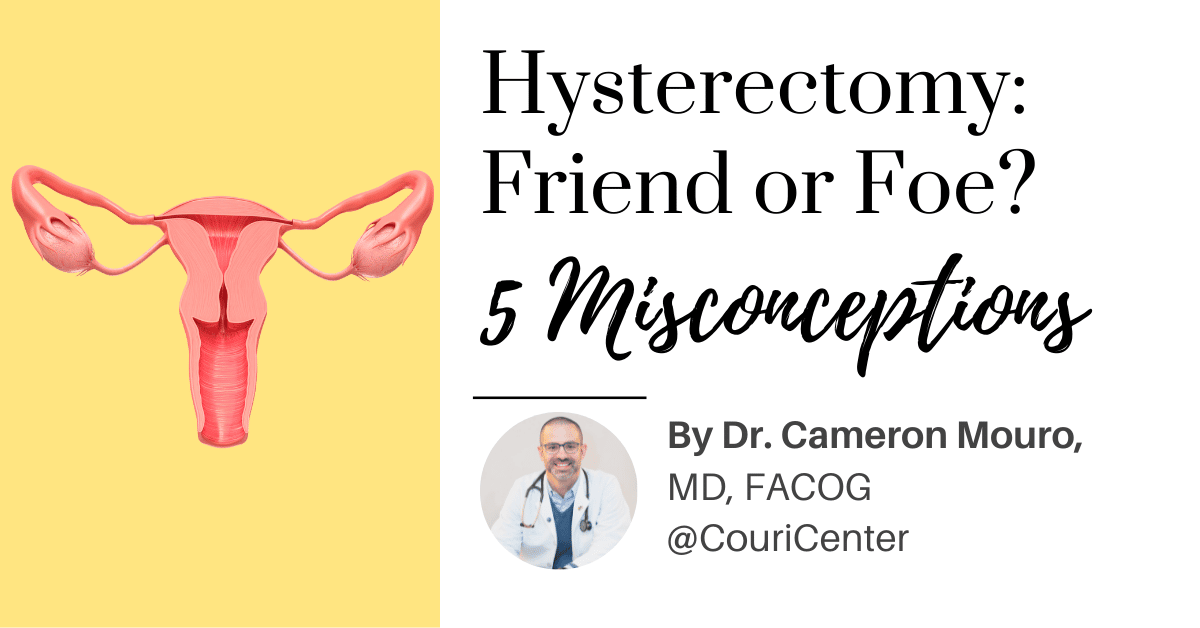
Hysterectomy – Friend or Foe?
5 Common Misconceptions By Dr Cameron Mouro, MD, FACOG, Couri Center for Gynecology and Integrative Women’s Health
Medical advancements over the past few decades have provided a greater variety of treatment options for heavy menstrual bleeding. Despite these advancements, hysterectomy remains the most definitive treatment, accomplishing a complete cure of the problem. Many women reach a point in their journey of dealing with heavy periods where hysterectomy becomes the best option. Even in such a situation, making the decision to proceed with a hysterectomy can be difficult. In my 15 years of experience thus far, I have found that a major contributor to this difficulty is commonly held misconceptions about hysterectomy. In helping my patients reach a treatment decision with confidence, I am often discussing these very understandable misconceptions. Below I have listed and addressed a few of the most common.
Misconception #1: Hysterectomy causes menopause or hormone imbalance
Hysterectomy only involves the removal of the uterus and not the ovaries. The ovaries are the source of essential hormones, both estrogen, and testosterone. Removal of the ovaries would cause immediate menopause. However, in most cases, removal of the ovaries during hysterectomy is not required. In fact, for the majority of women undergoing hysterectomy, preservation of the ovaries is recommended. Doing so allows normal hormone function to continue after hysterectomy, preventing the need for hormone replacement and allowing a woman to undergo menopause naturally later in life.
Misconception #2: Hysterectomy increases the risk of pelvic organ prolapse
Pelvic organ prolapse is the dropping of pelvic organs, like the bladder, into the vaginal space. Sometimes a hysterectomy is completed as part of the treatment of already occurring prolapse. However, hysterectomy itself does not cause prolapse or increase the risk of prolapse. Studies have confirmed that if certain standard techniques are used during the hysterectomy, or if the cervix is preserved, the risk for developing pelvic organ prolapse later in life is the same as it is for women who do not have a hysterectomy.
Misconception #3: Hysterectomy will make sex painful or less enjoyable
In most cases, a hysterectomy is performed for conditions like heavy menstrual bleeding that negatively impact a woman’s sex life. As a result, sexual function is most often improved for a woman after a hysterectomy. Several extensive surveys over the past few decades have confirmed this outcome. Most women reported improved enjoyment of sex, and very few reported pain with intercourse. Also, with the preservation of the ovaries, normal hormone function is maintained such that libido (sex drive) and the ability to orgasm are not hindered by hysterectomy.
Misconception #4: Hysterectomy will cause weight gain
Weight changes after hysterectomy are rare, even when the ovaries are removed. The hormone deficiencies that occur with the removal of the ovaries can lead to changes in metabolism and subsequent weight gain for some women. Still, such changes can be prevented with bioidentical hormone replacement, a healthy diet, and exercise. With the preservation of the ovaries, weight gain is very rare. Like sexual function, the conditions leading to hysterectomy also hinder a woman’s active lifestyle, causing fatigue and pain that prevent exercise. After a hysterectomy, when the recovery time is completed, most women have improved vigor and quality of life.
Misconception #5: Hysterectomy requires a long recovery
For many decades hysterectomies were done through a large incision on the abdomen (abdominal hysterectomy). Healing after this type of hysterectomy took a long time; it was often several months before a woman fully recovered. However, most hysterectomies today are completed through minimally invasive techniques, such as robotic and vaginal hysterectomy. The recovery after these methods is much shorter. After a minimally invasive hysterectomy, most women can return to work within two weeks and fully recover by 6 to 8 weeks.
Although hysterectomy is not a first-line treatment for heavy menstrual bleeding, many women reach a point where it becomes an important option to consider. It is the only option that provides complete resolution of heavy bleeding and, contrary to some commonly held beliefs about hysterectomy, it can be done without causing other long-term problems. If you are suffering from heavy and/or prolonged menstrual bleeding, schedule your consultation online or call 309-692-6838. We at the Couri Center are here to help. New patients are welcome.
Dr. Mouro
